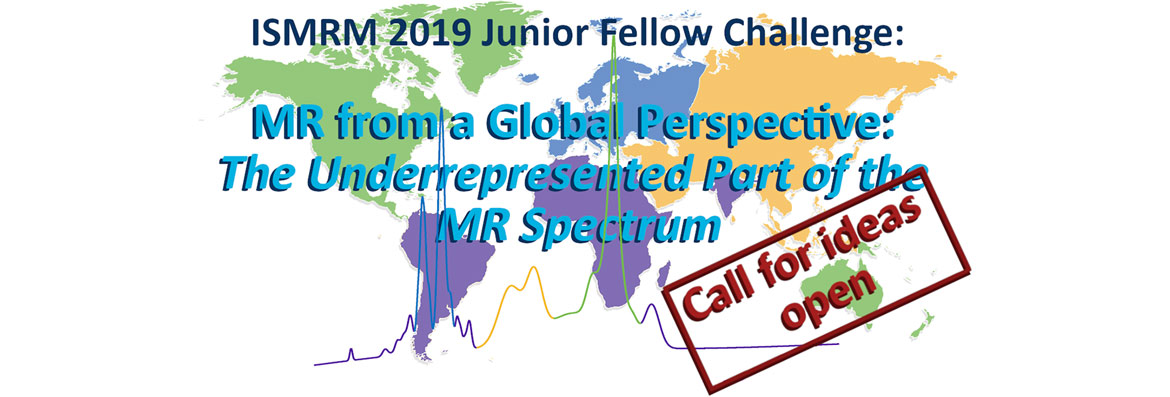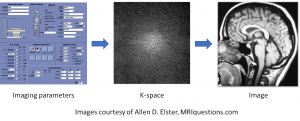
2019 Junior Fellow Challenge
MR from a Global Perspective:
The Underrepresented Part of the MR Spectrum
CLOSED
Idea Submission Deadline: 30 January 2019, 23:59 EST
Help these speakers with the challenges they are facing in their communities.
African Challenge – The development of training software to simulate MRI experiments and provide visual training tools to help understand MRI technology.
Indian Challenge – Create a successful stroke MR solution that addresses one or more of the imaging goals while being accessible in a geography like the seven states of Northeast India.
South American Challenge – Generate a system that can store clinical data known as risk factors for vascular dementia: for example, blood pressure, glycemia, and cholesterol together with MRI data (e.g. DICOM).
Even though the ISMRM is an international society for magnetic resonance in medicine, its members mostly work in the US and Europe. This is also reflected by a strong research focus on medical needs in those regions of the globe. MR research and open questions from the global south remain niche topics and rarely find their way into publications and conference contributions. The reason for that are mostly resource scarce circumstances, where currently available MR scanners cannot be afforded and/or operated. Remaining in the shadows does not give a voice loud enough for these issues to be heard in order to motivate fellow researchers to work on diagnostic, clinical and technological solutions. In next years Junior Fellow Symposium at the ISMRM 2019, we want to focus on the “I” in ISMRM and give a platform to the voices that are often unheard but that speak for around half of the world population.
Apart from three presentations representing the regions South America, India and Africa at the 2019 ISMRM Annual Meeting, we prepared something special.
We asked the speakers to challenge you, the members of the ISMRM community, with a particular challenge that they are facing. And we ask you to help the speakers with ideas on how to solve this challenge. Here are the three challenges:
 African MRI Challenge: Open Source MR Training Software
African MRI Challenge: Open Source MR Training Software
Dr. Johnes Obungoloch1
1 Faculty of Applied Sciences and Technology, Mbarara University of Science and Technology, Mbarara, Uganda
 Indian MRI Challenge: Accessible Stroke MRI
Indian MRI Challenge: Accessible Stroke MRI
Dr. Sairam Geethanath1-2
1 Medical Imaging Research Center, Dayananda Sagar Institutions, Bangalore, India
2 Columbia University Magnetic Resonance Research Center, Columbia University in the City of New York, USA
 South American MRI Challenge: Prevention of Vascular Dementia
South American MRI Challenge: Prevention of Vascular Dementia
Dr. Maria Otaduy1, Prof. Dr. Claudia da Costa Leite1
1 Department of Radiology and Oncology, University of Sao Paulo, Sao Paulo, Brazil
For each challenge ideas can be submitted (see submission guidelines below), which will be reviewed by the speakers and other MR experts. The ideas don’t need to be fully worked out and there is no strict format, so be creative. You are also invited to prepare a video and post it in the Slack channel #2019_jfs_challenges or post a link to the video in the submitted idea abstract.
To give our speakers a chance to introduce their challenges to you before the ISMRM 2019, we are planning a virtual meeting on 12 December 2018. Please click here to register for this virtual meeting.
The best ideas will be selected to be presented at the ISMRM 2019 in Montreal, Canada during the Junior Fellow Symposium. After the winning ideas are pitched, teams will be formed around each idea. In a follow up, these teams can then collaboratively work with the speaker to realize the idea.
Let us…
…sensitize the MR community for medical/technical/economic challenges outside the (local) box
…strengthen diverse collaborations by connecting researchers/clinicians from resource rich with researchers/clinicians from resource poor settings
…give a voice to and empower researchers globally
…improve diagnosis and treatment of many more patients by bringing MRI to the world
So the challenges are on! What ideas do you have?
– Your Junior Fellows 2018
Submission Guidelines
Idea Submission
In order to ensure readability we put together some guidelines. Please submit your ideas as a pdf document of:
- Maximum one A4 page (including all figures) with minimum margins of 25.4 mm on all sides
- Maximum 20 MB
- Font type: Arial, Helvetica, or similar sans-serif typeface
- Minimum Font Size: 10 pt for normal text, author names and affiliations; and 12 pt for abstract title and subheaders (e.g. Introduction, Methods, …)
- Underline the presenting author
There is no strict format for the submission of your ideas on how to solve one of the challenges. Make sure the judges understand your idea, and that you try to answer the questions outlined in the challenges. Several graphics that illustrate your idea can be a great tool to make your idea more comprehensible.
Template & Video
You can download a template in .docx format here. After you finished editing, save the document as .pdf and upload it using the submission form. Furthermore, we invite you to prepare a video – no longer than 5 minutes – outlining your idea and post it in the Slack channel #2019_jfs_challenges or post a link to the video in the submitted idea abstract.
THE SUBMISSION DEADLINE HAS PASSED
